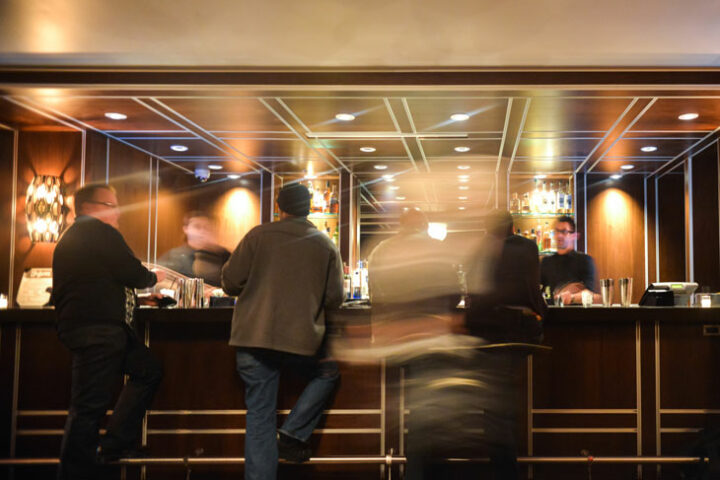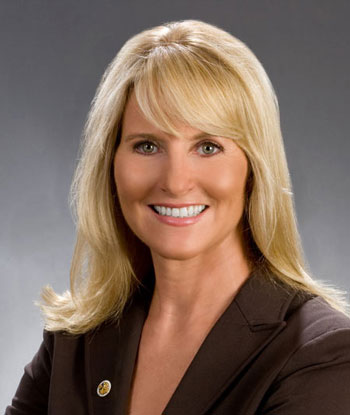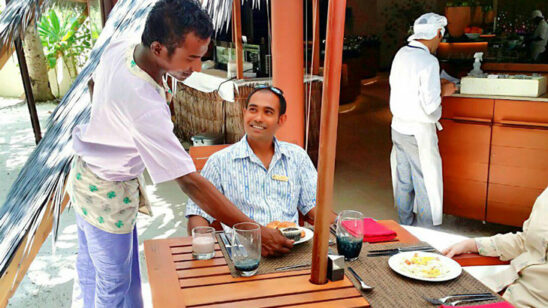
Industry Expert: Take the service elevator to the top floor
[vc_row][vc_column][vc_column_text]Roberta Nedry[/vc_column_text][vc_single_image image=”9988″ img_size=”full” alignment=”center”][vc_empty_space height=”16px”][vc_column_text]
Get the C-Suite Ready for Customer Experiences
Customer experience management is increasingly critical as a top investment area and skill essential for C-suite executives (some firms even have a CXO). What does that mean exactly and what do leaders need to do to ensure they are ready? How will they proactively acquire these skills and mindset when there is no single or even clear roadmap as to exactly what to do or how to do it? On top of that, the new science of customer emotions is inspiring even more considerations and most CEO’s don’t like to ‘get emotional’ about their business strategies! Some are finding their way in the dark. Yet, more and more evidence shows the direct relationship of emotional intelligence as part of the customer experience strategy. It’s time to figure it out!
Gartner Incorporated, a leader in technology and research predicts that this year, 89% of companies expect to compete mostly on the basis of customer experience, versus 36% four years ago. Another global study by customer experience solutions provider Amdocs revealed that the most commonly added new C-level roles hold responsibility for customer experience. CEO management styles will need to change and have the ability to inspire innovation and change in how and what experiences are delivered and how the organization will function to support them. “The study shows customer experience is becoming increasingly critical with CEO’s of the largest service providers in the world viewing it as a top investment area in 2020,” Eric Updyke, Group President of System integration and operations at Amdocs.
Studies like these support getting up to speed fairly quickly on customer experience management. How many executives know how to go about that and get these skills the market is now demanding and which trends are forecasting will be critical? Who will orient and train them so they can train, orient, lead and inspire their organizations which must deliver those experiences?
On top of that, social media provides today’s consumers with lots of channels providing feedback on their personal customer experiences. Hospitality leaders and their organizations are getting lots of reviews and comments on the customer experiences they provide, whether they want them or not and whether they are designing them or not.
Executives must define, deliver and manage experiences that will rally employees to deliver better and more memorable experiences, matching or exceeding customer expectations. Going beyond brand loyalty and into the deeper science of emotional connections is essential for stronger guest loyalty and impressions.
Whether it’s a conference center, a local restaurant or a leading international hotel, customer experience management needs to be in play and top of mind for business leaders, the hospitality industry and their teams. Each touchpoint, each point of customer contact will contribute to a comprehensive series of events that will yield the final experience impression. Each time the baton is passed, another mini-moment takes place and adds to the complete experience timeline and impact. How can those mini-moments be managed for maximum yield and how do leaders charge up their own customer experience skills and knowledge? How do those in the C-Suite make sure that C now stands for Customer Experience which will be essential to their long term success?
When we work with our clients in a variety of industries on this exact topic and advise senior executives on developing their own customer experience skills, we are continually surprised by the disconnects between perceptions and intentions.
Often the orientation from the top seems to be missing how to lead their teams to have more experiential mindsets and better understand their roles in managing expectations and emotions along their guests’ experience journey. Most of the time, intentions are good, even excellent but the resulting perceptions are less than desired. Why is that? What is the trick to closing that gap?
One of the answers is very simply shifting preconceived mindsets to an experiential focus in all areas of the hotel or business and on all employees who are involved. It means really understanding how emotional engagement takes place and what kinds of moments or interactions or even behaviors may be overlooked as it relates to the experiential contributions they could be making. It requires detailed identification and mapping out of experiences and where the gaps might be along with the opportunities.[/vc_column_text][vc_empty_space height=”16px”][vc_single_image image=”9992″ img_size=”full” alignment=”center”][vc_empty_space height=”16px”][vc_column_text]For example, getting a cup of coffee while getting your car serviced may seem simple, ordinary and even expected. Most automobile dealerships either have a coffee machine in the waiting room or with some luxury brands, an actual coffee bar. It’s one of those simple gestures of hospitality yet can get so complex in delivery if an experiential focus did not drive the coffee set up.
During my last car service visit, I needed that cup of coffee badly. I saved my morning coffee allocation for my trip to the dealer, knowing I would have time to sip and really enjoy it while waiting for my car to be ready. However, that day, the coffee machine was not working. After asking several people, including the manager, if they could help me get a cup of coffee, no one could get me a cup of coffee or fix the machine. No coffee would be my experience that day. Then, an unexpected hero showed up; one of the service mechanics who fixed the machine. It was a new day! The manager came by and I showed him how one of his mechanics had fixed it. His response: “I am just a manager; I don’t fix things. Glad he could help.”
I almost burned my tongue on my coffee with that comment. A manager that does not fix things seemed to be a mental typo. Saying it in front of his employees seemed like a double whammy. Could that really be? He made it that far with the attitude that fixing things is NOT a part of management and without understanding how that cup of coffee was a small but huge part of the experience? He did not understand the emotional connection I was seeking, even through a cup of coffee and he certainly did not understand how it fit into the overall car service experience. On top of that, he seemed to reflect a lack of interest in even fixing it to be a better part of the experience nor to recognize the mechanic who came to the experience rescue. He did not have a customer experience skill set and as a manager was not leading his team to have that mindset either. In fact, his comments showed the opposite and promoted a disconnected experience and more of a silo focus on job duties.
More recently, I attempted to arrange for a room amenity and dinner for two dear friends on their honeymoon in Hawaii. My family wanted to give them ‘an experience’ instead of purchasing dishes or a tangible gift. I called the major brand hotel with the guest names and arrival dates. I then spent about 25 minutes on the phone with the hotel (long distance) going through complicated channels to try and arrange this. One part of the hotel had their names and arrival date but the concierge with whom I was trying to arrange the amenity did not have the guest info on her system. What would seem to be a rather routine request and an even bigger opportunity to make a lot of people happy turned out to be challenging, complicated and inefficient. They kept placing me on hold to try and figure out connecting the two pieces of information and departments within the same hotel! After no success with tracking down the reservations we moved on to what amenity/gift I would like to arrange so we would have that in mind when the reservation was located and confirmed. The concierge steered me away from a dinner experience and suggested a general gift card so that the guests could choose how and what to spend the dollars on.
While those intentions were good and even practical, my perception was that the concierge was not on my wavelength when it came to delivering experiences. She just wanted to complete the process of addressing my request. She wanted to make it more generic, more simple, more ordinary and more convenient. Her intentions were good but she did not make an essential emotional connection with me or the pending experience. I wanted to give my friends ‘an experience’, something I chose for them to remember us by, something specific, something personal and a memory they could reflect upon in later years as our gift to them. This is the same approach the whole hotel should be taking. This is what the C-Suite team should and could have been emphasizing in order to deploy true guest experience management and inspiring opportunities to make those emotional connections.
This concierge did not understand the experience and broke down my request into specific actions and procedures to accomplish a specific task. She did not look at the experience I wanted to have in giving the gift nor did she consider how this would add to the whole experience for these arriving guests and that they were honeymooners. And, my experiential request was going to add revenue to the hotel. A top down customer experience approach facilitates bottom lines being up! The win was huge for all parties involved with that guest experience focus. Neither she or the hotel seemed to have an experiential mindset or even framework for making a rather common type of request happen in a more emotionally connected way. The hotel may have an outstanding reputation, provide wonderful memories and deliver incredible service but they are missing making a stronger emotional connection with a potential guest (me) and the arriving guests (the honeymooners). None of the tools, techniques and training available to this concierge seemed to support the fundamental notion that her role was not merely procedural. She was completely ill equipped to help me help her deliver a meaningful and personal experience to her own guests.[/vc_column_text][vc_empty_space height=”16px”][vc_single_image image=”9987″ img_size=”full” alignment=”center”][vc_empty_space height=”16px”][vc_column_text]What would her general manager have done instead with a Customer Experience mindset that permeated every line position of the hotel and united each employee in the important role they play in creating experiences that are personal and meaningful?
There are many ways for C-Suite hospitality leaders to enhance their own Customer Experience skills and align and empower their teams to integrate experiential applications into their daily routines.
First, leaders must understand where any one experience begins and where it ends. They must understand all the spheres of influence on those beginnings, endings and everything in between. They must understand that everyone on their team will or will not impact emotional connections in a positive, negative or indifferent way. This applies to employee interactions with each other as well as with guests.
Customer Experience Management requires time to analyze and map out current and desired experiences. It means training teams on the interpersonal behaviors that will lead to stronger emotional connections. It means orienting everyone from top to bottom, internal and external roles, front of the house and back of the house, contracted services and vendors as to their role on the complete stage of the experience.
It means defining expectations and standards for the experience while allowing for the personal touch or customization and then holding everyone accountable to ensure each there is consistent, constant and persistent attention to the complete experience, not just pieces of it or parts that may seem more obvious. It is blending the procedural and personal sides of service delivery so that a balanced and meaningful result happens.
It means paying attention to the current feedback that is coming in and seeking feedback as new experiences are delivered. It means looking at data and paying attention to not only the information but how it relates to intentions versus perceptions.
Oberoi, a little know regional luxury brand headquartered in Delhi in India did just that as documented in a March 2015 Harvard Business School case. They developed a ‘secret sauce’ consisting of intensive use of technology and training to impact their guest experiences in more meaningful ways based on a comprehensive customer experience focus, beginning with Vikram Oberoi, Chief Operating Officer of the Oberoi Group, the hotel chain that carried his family’s name . Their mission is to ensure no guest leaves an Oberoi hotel unhappy. They looked at numerous guest scenarios and feedback, that were good as well as areas to improve and they actively explored what would have made these experiences better or why they resonated with their guests in the first place. They looked at ways to empower employees on the spot with experiential actions and they reviewed service recovery opportunities even when the guest went a bit overboard with their concerns. They fostered a culture of excellence from the top down and reinforced the importance and relevance of the data they collected as it related to the overall experiences they were and are delivering. Recently Oberoi was voted world’s top brand by Leisure+Travel Magazine ahead of Four Seasons and Ritz. It is possible and everyone can discover some secret sauce when customer experience skills and mindsets come from the top and infiltrate every part of the organization.[/vc_column_text][vc_empty_space height=”16px”][vc_separator][vc_empty_space height=”16px”][vc_column_text]Here are five questions top leadership should ask themselves to determine whether they are providing their own secret sauce for their teams to be able to deliver memorable experiences leav-ing an emotional mark on the guest and if they are developing their own Customer Experience Leadership skills:
- What do you and your frontline personnel know each day about the specific experience expectations of your guest?
- How well connected are key frontline employees to one other to actually deliver a seamless experience?
- What are you personally doing to understand which touchpoints are interfering with service delivery and which ones are enhancing guest experiences the most?
- What percentage of your training efforts are devoted to experience management and design?
- Would you and all of your staff give the same answer to the question to “what is our secret sauce?”
Pour it on. Get the secret sauce going. Make sure you are sweet on the C-Suite skills of Customer Experience Management. Without them, you may be headed for a lower floor and a lower score.[/vc_column_text][vc_empty_space height=”16px”][vc_separator][vc_empty_space height=”16px”][vc_column_text] Roberta Nedry has spent over 32 years exploring, delivering and managing guest and customer experiences and service training. Ms. Nedry is the designer of 3D Service®, a unique service training methodology integrating touch points, behavior and how to drive positive customer emotions recognizing the multiple dimensions of except ional service. She was the featured expert on Guest Experience Management at the inaugural Boutique Lodging and Lifestyle Conference in Los Angeles and often speaks on customer, guest and patient experiences and excellence.
Roberta Nedry has spent over 32 years exploring, delivering and managing guest and customer experiences and service training. Ms. Nedry is the designer of 3D Service®, a unique service training methodology integrating touch points, behavior and how to drive positive customer emotions recognizing the multiple dimensions of except ional service. She was the featured expert on Guest Experience Management at the inaugural Boutique Lodging and Lifestyle Conference in Los Angeles and often speaks on customer, guest and patient experiences and excellence.
A former California’s Junior Miss (now Distinguished Young Women of America), Ms. Nedry started her guest service training with Walt Disney Productions and was selected as a two time Disney “Ambassador to the world” finalist. She holds a B.A. In Linguistics from UCLA and is fluent in French, proficient in German and Spanish, with studies in Japanese and Italian. Ms. Nedry can be contacted at877-436-3307 or
roberta@hospitalityexcellence.com.[/vc_column_text][/vc_column][/vc_row]






